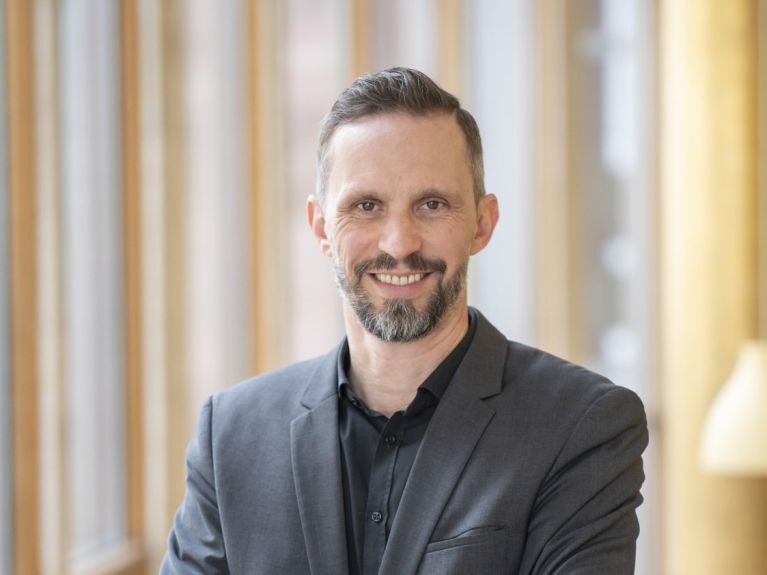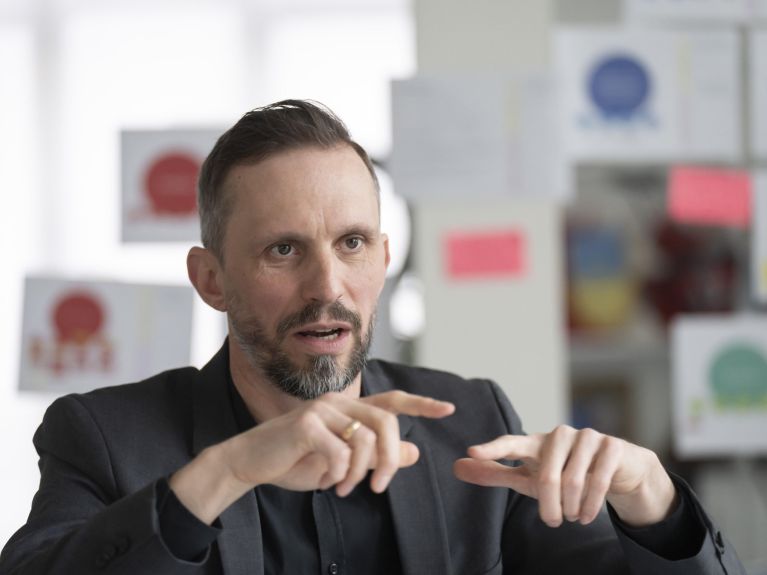“I would like to see more genuine exchange”
ARD Chairman Florian Hager talks in our interview about the current and future challenges faced by public service broadcasting in Germany.

Mr Hager, the ARD is celebrating its 75th anniversary in 2025. Why does Germany still need public service broadcasters - or PSBs for short - and why will it continue to need them in the future?
The ARD’s latest acceptance study indicates that the ARD has become significantly more popular, particularly among the younger generation. 76 percent of 14- to 24-year-olds use the ARD’s online services on a weekly basis - that’s 20 percentage points up on 2023. Nonetheless, the way we use media will continue to change radically: young people are increasingly using virtual assistants to understand the world via questions and prompts. We at the ARD have to adapt accordingly to ensure that our content is actually found. We have a strong presence on social media - take for example the tagesschau [news programme] on Instagram, which has 5.9 million followers. We know from media research that people are increasingly losing faith in democracyon the one hand, yet on the other are becoming more interested in politics. They are looking for reliable, independent and correct information - and they are turning to us to get it. We were founded 75 years ago as a democratic counterpart to the state broadcasting services controlled by the Nazis. From the very beginning, it has been our job to provide independent and balanced reporting without any state control. Our challenge now is to ensure that we continue to do this in future. It is clear that we will have to change as a result, and we are working on this.
It is clear that we will have to change, and we are working on this.
What is the situation in Germany as regards freedom of the press? And how do you ensure independent reporting from countries where freedom of the press is restricted - in some cases to a massive extent?
Freedom of the press is an essential pillar of democracy, and we also have to take care in Germany that this pillar is not undermined by fake information and hate speech. In the global ranking of press freedom conducted by Reporters Without Borders, Germany is only placed eleventh because more and more journalists are being attacked. We must protect our ARD colleagues - not only those in Germany, when they are reporting for example on demonstrations, but also of course our foreign correspondents abroad. In some countries we have a core journalistic remit to expose deficiencies, abuses and wrongdoing in the system and to report on censorship and attempts on the part of the authorities to control media coverage. The ARD has one of the world’s largest networks of foreign correspondents, enabling us to keep close to the people on the ground and their stories. The same applies to our regional networks, which is the ARD’s DNA. In an age of AI, our most important job is to be close to people at the local level.

How do you respond to the accusation that PSBs are often too one-sided in their reporting or commentaries - which tends to mean “too left-wing” - and that there is insufficient diversity of opinion in general?
Such accusations come from both sides: some complain that conservative right-wing opinions are given too much airtime on the ARD, while others accuse us of having a left-wing bias in our reporting. And generally, when I ask for specifics, the explanations given are pretty vague. When we report on human-induced climate change, it is not a question of “left-wing green” reporting, but the scientific consensus. What is important is for us not to fuel any “false balance”in our reporting. Naturally, our remit is to provide balanced and truthful reporting throughout our programming. This is the journalist’s fundamental craft. Where journalists express opinions or attitudes, these are always transparently indicated. And yes, we also make mistakes sometimes. That’s why we constantly evaluate our programme and are our own harshest critics - the aim being to guarantee a basic level of plurality. After all, having a lot of content doesn’t automatically mean a lot of diversity. And yes, we can up our game even further in that sense: we need even more diverse opinions and perspectives. Having said that, we also have to present these different perspectives in debates and enable people to have respectful conversations. I don’t believe in sending people with contrary views into a media arena and then sitting back to watch them scream at one another. I would like to see more genuine exchange, with people listening to and accepting other opinions.
We need even more diverse opinions and perspectives.
Do you see the ARD as having a responsibility to take active steps to counter disinformation?
We have teams of fact checkers to identify disinformation. In my opinion, however, we will never succeed in exposing all fake news reports. Our own content has a much greater impact because everything has been properly researched by investigative journalists. But I also see the ARD as having a responsibility that goes beyond this. It’s largely about digital sovereignty - about our dependence on digital tech corporations. When Mark Zuckerberg, the CEO of Meta, describes fact checks on social media as “institutionalised censorship” or US Vice President JD Vance openly threatens that the US will no longer defend Europe in the event of war if we regulate platforms, this makes me extremely concerned. Of course, we also present our content on these digital platforms, but we have deliberately opted for a broad-ranging presence and spread our content across different platforms to ensure that we could continue to supply a basic level of information even if one of the platform operators were to pull the plug on us. Information and education help counter disinformation: we take our media literacy projects into schools, for example, and explain to children how they can identify fake news. In future, journalism will need not only to convey content but also explain more precisely how and why content is selected. And explain what is being left out.
About the interviewee
Florian Hager, born in Aalen in 1976, graduated in audiovisual media, journalism and film studies. During the course of his career, he has worked for television broadcasters ZDF, 3sat and ARTE. Since March 2022, Florian Hager has been chairman of regional broadcaster Hessischer Rundfunk, and in January 2025 began a two-year term as the ARD’s chairman.
The ARD
The ARD (Association of Public Broadcasters in Germany) was established in 1950 and, together with nine regional broadcasters, the ZDF (Zweites Deutsches Fernsehen), the international broadcaster Deutsche Welle and Deutschlandradio, comprises public service broadcasting in Germany. Around 23,000 employees work for eleven television and 55 radio stations. The ARD receives the majority of its funding from the licence fee, which every household in Germany is required to pay.


